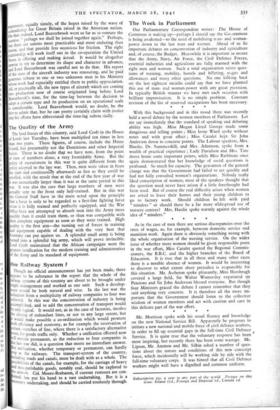The Quality of the Army
The land forces of this country, said Lord Croft in the House of Lords last Tuesday, have been multiplied ten times in less than two years. These figures, of course, include the Home Guard, but presumably not the Dominions and other Imperial rces. There is no doubt thlt we have now, from the point of view of numbers alone, a very formidable Army. But the policy of recruitment in this war is quite different from the policy adopted in the last war. Then, men wete taken in from the start and continuouIty afterwards as fast as they could be nrolied, with the result that at the end of the first year of war it was numerically larger than it was at the same period in this ar. It was also the case that large numbers of men were tually sent to the front only half-trained. But in this war the General Staff have in the main acted upon the principle that a force is only to be regarded as a first-line fighting force hen it is fully trained and perfectly equipped, and the War ffice have not attempted to absorb men into the Army more uickly than it could train them, or than was compatible with err complete equipment as soon as they were trained. High • uality is the first aim—the turning out of forces in training and equipment capable of dealing with the very best that ermany can put against us. A splendid small army is being turned into a splendid big army, which will prove invincible. Lord Croft maintained that the African campaigns were the greatest justification for the modern training and administration f the Army and its standard of equipment.






























 Previous page
Previous page